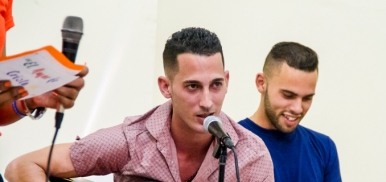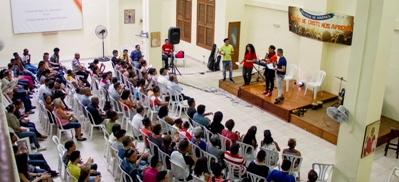The celeb ration of the “Week of Prayer for Unity of Christians” at Havana was highlighted by a particular moment, the Ecumenical Youth Festival, at its third edition. Created with the aim of encouraging a more active participation of the youth in the ecumenical movement, the festival project began to take shape and became an annual meeting of young Christians of Havana. The “Week of Prayer” was enlivened by the youth sectors of the Focolare Movement, Community of Sant’Egidio and Council of Churches of Cuba. Inspired by this year’s “Christ’s love compels us” (2 Cor 5, 14-20), which was also the festival’s motto, the programme of dance, music, and drama staged in this edition saw the participation of about 150 youths of various communities of different Christian denominations. The meeting began on Sunday, 22 January, in the Headquarters of the Community of Sant’Egidio, in the historical centre of the Cuban capital. The representatives of the Cuban Council of Churches also took part in the event, along with Bishop Juan García, Archbishop of Havana, who in his brief greeting, encouraged the youths to see themselves as members of a sole body, a sole family.
ration of the “Week of Prayer for Unity of Christians” at Havana was highlighted by a particular moment, the Ecumenical Youth Festival, at its third edition. Created with the aim of encouraging a more active participation of the youth in the ecumenical movement, the festival project began to take shape and became an annual meeting of young Christians of Havana. The “Week of Prayer” was enlivened by the youth sectors of the Focolare Movement, Community of Sant’Egidio and Council of Churches of Cuba. Inspired by this year’s “Christ’s love compels us” (2 Cor 5, 14-20), which was also the festival’s motto, the programme of dance, music, and drama staged in this edition saw the participation of about 150 youths of various communities of different Christian denominations. The meeting began on Sunday, 22 January, in the Headquarters of the Community of Sant’Egidio, in the historical centre of the Cuban capital. The representatives of the Cuban Council of Churches also took part in the event, along with Bishop Juan García, Archbishop of Havana, who in his brief greeting, encouraged the youths to see themselves as members of a sole body, a sole family.  This year, the event was characterised by a family atmosphere which was tangible in all the various activities. It was not only a show where every church or community performed its piece of the festival. But it was an event accomplished by people who considered one another more and more as brothers, thanks to the relationship established during the years, between one festival and the other, through meetings, dinners, celebrations and mutual help. The group that led the festival was composed of Catholics, Baptists and Pentecostals; the choir was formed by youths of various churches, and accompanied the songs presented by a Catholic. The theatre piece was created by a Pentecostal youth and performed by a group of Catholic girls. «The desire and decision to live unity is already a reality,» one of the participants said. At the end of the programme, the idea that spontaneously came up was the decision “to hold the next festival in a public theatre.” This expressed the desire to testify before others, about the experience of unity concretely lived. From Havana, 22 January 2017
This year, the event was characterised by a family atmosphere which was tangible in all the various activities. It was not only a show where every church or community performed its piece of the festival. But it was an event accomplished by people who considered one another more and more as brothers, thanks to the relationship established during the years, between one festival and the other, through meetings, dinners, celebrations and mutual help. The group that led the festival was composed of Catholics, Baptists and Pentecostals; the choir was formed by youths of various churches, and accompanied the songs presented by a Catholic. The theatre piece was created by a Pentecostal youth and performed by a group of Catholic girls. «The desire and decision to live unity is already a reality,» one of the participants said. At the end of the programme, the idea that spontaneously came up was the decision “to hold the next festival in a public theatre.” This expressed the desire to testify before others, about the experience of unity concretely lived. From Havana, 22 January 2017
Be transformed by God’s presence
Be transformed by God’s presence




0 Comments